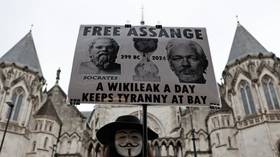Assange in plea deal talks with US – WSJ

The US Justice Department is considering whether to allow WikiLeaks founder Julian Assange to plead guilty to a misdemeanor offense in order to avoid extradition to the US on espionage charges, the Wall Street Journal reported on Wednesday.
The potential deal would see Assange plead guilty to mishandling classified information, with the five years he has already served in London’s Belmarsh Prison counting as his sentence, the unnamed sources told the newspaper.
Assange’s lawyers and US officials have held preliminary talks in recent months to sketch out a possible bargain, the sources said. However, Barry Pollack, a lawyer for the jailed journalist, told the newspaper that “there are no signs” that the department is ready to accept the deal.
If a deal were reached, it would end a legal battle in play for more than a decade. After his arrest by British police in 2010 for sexual offense allegations that he denied, Assange jumped bail in 2012 and was granted asylum in the Ecuadorian embassy in London. He was arrested again in 2019 when Ecuador revoked his asylum, and has remained in Belmarsh ever since.
The Justice Department unsealed an indictment against Assange on the day of his arrest, charging him with 17 counts of espionage. If extradited to the US and convicted, the former WikiLeaks boss faces up to 175 years in prison.
The charges stem from his publication of classified material obtained by whistleblowers, including Pentagon documents detailing alleged US war crimes in Iraq and Afghanistan.
The UK Home Office approved his transfer to American custody in 2022, but Assange – now in poor health after nearly five years of solitary confinement – has filed repeated appeals, none of which have been successful. Last month, Britain’s High Court postponed a decision on granting Assange a final chance to appeal his extradition.
Washington’s use of the Espionage Act to prosecute Assange is controversial, as the Australian-born journalist published, but did not steal, the classified material in question. Former US President Barack Obama refused to press charges against Assange for this very reason, arguing that his activity was no different from that of any newspaper, and was therefore protected by the First Amendment of the US Constitution.
With an election coming up this November, US President Joe Biden is keen to avoid the “political hot potato” of an extradited journalist arriving in Washington to face criminal prosecution, the Wall Street Journal wrote. Furthermore, American “prosecutors face diminishing odds that he would serve much more time even if he were convicted stateside,” the paper noted.













